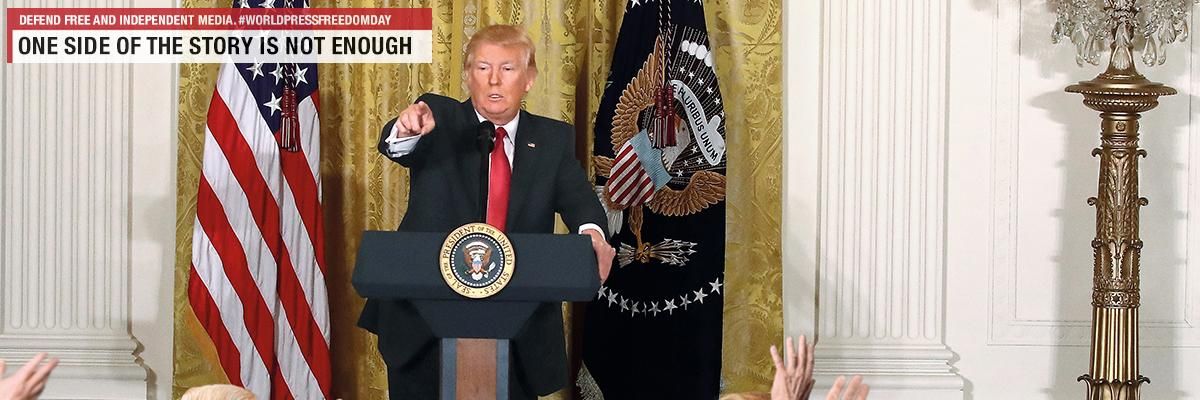
"Chipping away at the media also chips away at our right to be informed. We need access to credible information to engage meaningfully in our communities - and hold those in power to account." (Photo: IFEX)
To donate by check, phone, or other method, see our More Ways to Give page.

"Chipping away at the media also chips away at our right to be informed. We need access to credible information to engage meaningfully in our communities - and hold those in power to account." (Photo: IFEX)
With over 100 freedom of expression and press freedom organisations in 71 different countries, the IFEX network has its ear firmly to the ground when it comes to tracking shifts in the global climate for media.
As we mark another World Press Freedom Day on 3 May - the 25th anniversary of the very first World Press Freedom Day, in fact - one concern we share is the ramping up of efforts to control and undermine independent media. It's a problem all-too-familiar to many of our members; a new and growing concern for others. It's also reflected in UNESCO's theme for the day this year: Keeping power in check: Media, justice and the rule of law.
Chipping away at the media also chips away at our right to be informed. We need access to credible information to engage meaningfully in our communities - and hold those in power to account.
The race to control media is a race to the bottom; a race where everyone loses.
So yes, power shouldn't get to tell its own story, and the media have a critical role there. But the problem isn't just efforts from above to control the information we access. It's the Information Loops. The Bubbles. The Echo Chambers.
Sometimes these are created for us, by government efforts to contain the media, or by Facebook algorithms that limit our social media feed. Sometimes we help build them ourselves. They ensure that we hear only those we tend to agree with, voices that never make us uncomfortable, and opinions that reinforce our own. Whatever you prefer to call it, it's not good. Talking only to yourself - it's simply not healthy.
There is never just one side to any story. Democracy needs diversity, and that means a diversity of voices, and a diversity of opinions. It can't be overstated; press freedom is essential for that.
With that in mind, we chose to mark World Press Freedom Day this year by launching a series of evocative - and maybe slightly provocative - images.
We think you'll agree that there is definitely something wrong with these pictures.
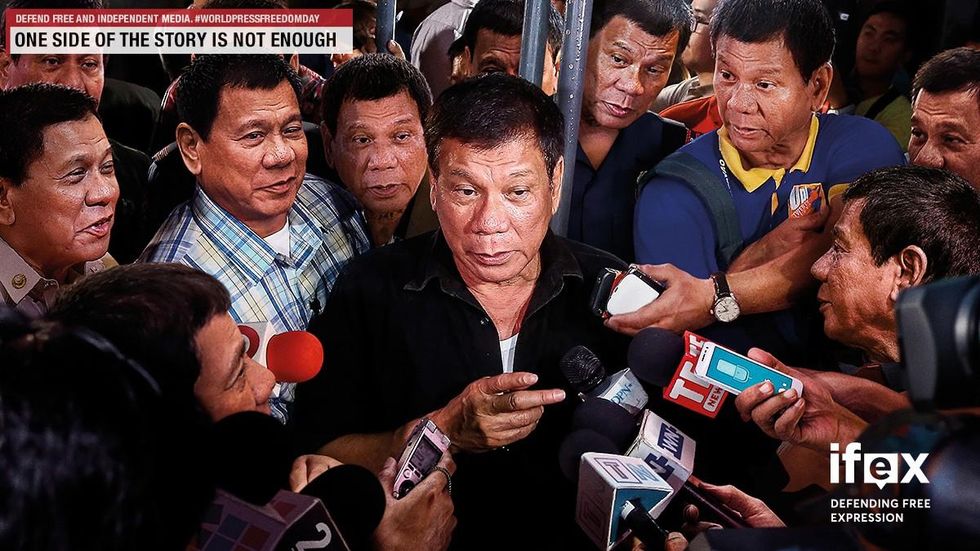
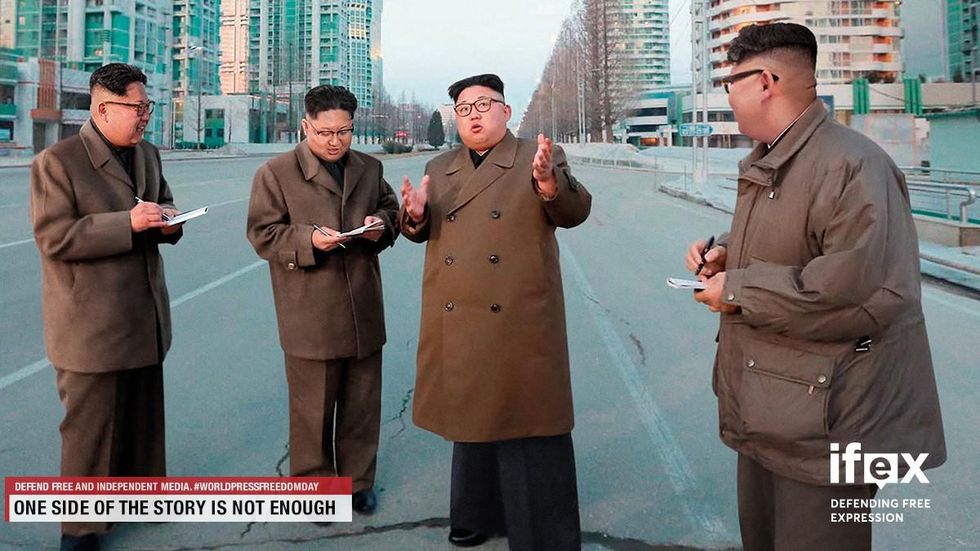
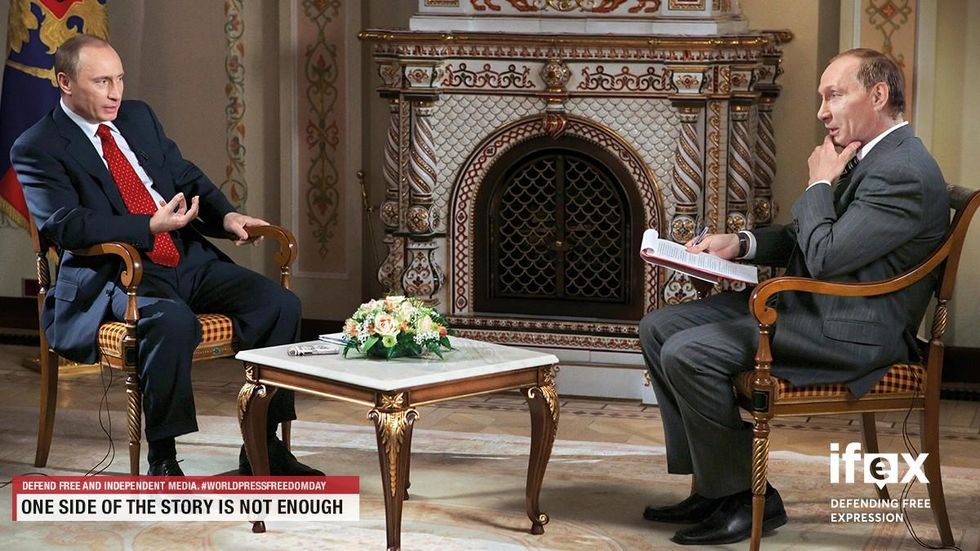
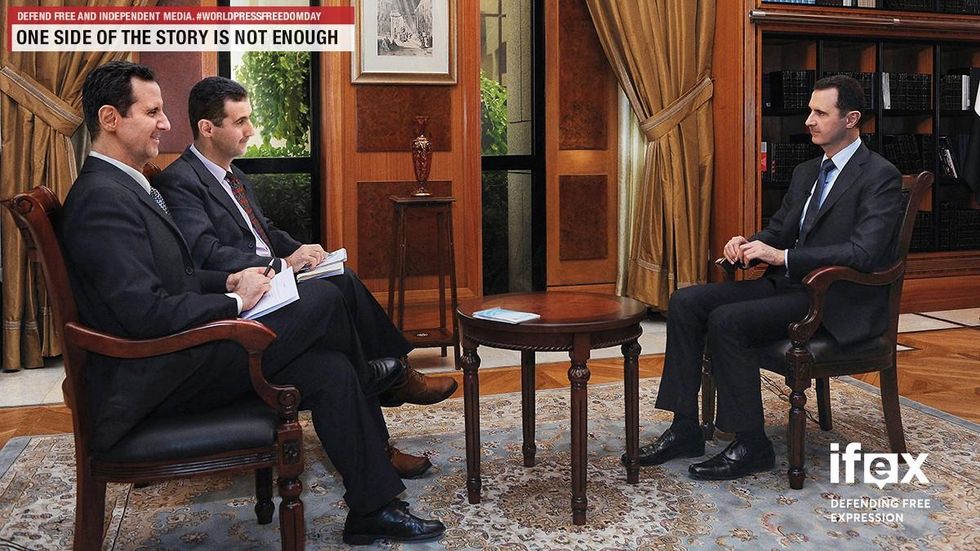
We hope everyone will join us in showing media around the world that we support them, we appreciate their efforts to bring us the many sides of each story, and we value their work. Well beyond World Press Freedom Day, the IFEX network and our allies will continue working to foster conditions that allow journalists to do their work, to not simply survive, but thrive.
Trump and Musk are on an unconstitutional rampage, aiming for virtually every corner of the federal government. These two right-wing billionaires are targeting nurses, scientists, teachers, daycare providers, judges, veterans, air traffic controllers, and nuclear safety inspectors. No one is safe. The food stamps program, Social Security, Medicare, and Medicaid are next. It’s an unprecedented disaster and a five-alarm fire, but there will be a reckoning. The people did not vote for this. The American people do not want this dystopian hellscape that hides behind claims of “efficiency.” Still, in reality, it is all a giveaway to corporate interests and the libertarian dreams of far-right oligarchs like Musk. Common Dreams is playing a vital role by reporting day and night on this orgy of corruption and greed, as well as what everyday people can do to organize and fight back. As a people-powered nonprofit news outlet, we cover issues the corporate media never will, but we can only continue with our readers’ support. |
With over 100 freedom of expression and press freedom organisations in 71 different countries, the IFEX network has its ear firmly to the ground when it comes to tracking shifts in the global climate for media.
As we mark another World Press Freedom Day on 3 May - the 25th anniversary of the very first World Press Freedom Day, in fact - one concern we share is the ramping up of efforts to control and undermine independent media. It's a problem all-too-familiar to many of our members; a new and growing concern for others. It's also reflected in UNESCO's theme for the day this year: Keeping power in check: Media, justice and the rule of law.
Chipping away at the media also chips away at our right to be informed. We need access to credible information to engage meaningfully in our communities - and hold those in power to account.
The race to control media is a race to the bottom; a race where everyone loses.
So yes, power shouldn't get to tell its own story, and the media have a critical role there. But the problem isn't just efforts from above to control the information we access. It's the Information Loops. The Bubbles. The Echo Chambers.
Sometimes these are created for us, by government efforts to contain the media, or by Facebook algorithms that limit our social media feed. Sometimes we help build them ourselves. They ensure that we hear only those we tend to agree with, voices that never make us uncomfortable, and opinions that reinforce our own. Whatever you prefer to call it, it's not good. Talking only to yourself - it's simply not healthy.
There is never just one side to any story. Democracy needs diversity, and that means a diversity of voices, and a diversity of opinions. It can't be overstated; press freedom is essential for that.
With that in mind, we chose to mark World Press Freedom Day this year by launching a series of evocative - and maybe slightly provocative - images.
We think you'll agree that there is definitely something wrong with these pictures.




We hope everyone will join us in showing media around the world that we support them, we appreciate their efforts to bring us the many sides of each story, and we value their work. Well beyond World Press Freedom Day, the IFEX network and our allies will continue working to foster conditions that allow journalists to do their work, to not simply survive, but thrive.
With over 100 freedom of expression and press freedom organisations in 71 different countries, the IFEX network has its ear firmly to the ground when it comes to tracking shifts in the global climate for media.
As we mark another World Press Freedom Day on 3 May - the 25th anniversary of the very first World Press Freedom Day, in fact - one concern we share is the ramping up of efforts to control and undermine independent media. It's a problem all-too-familiar to many of our members; a new and growing concern for others. It's also reflected in UNESCO's theme for the day this year: Keeping power in check: Media, justice and the rule of law.
Chipping away at the media also chips away at our right to be informed. We need access to credible information to engage meaningfully in our communities - and hold those in power to account.
The race to control media is a race to the bottom; a race where everyone loses.
So yes, power shouldn't get to tell its own story, and the media have a critical role there. But the problem isn't just efforts from above to control the information we access. It's the Information Loops. The Bubbles. The Echo Chambers.
Sometimes these are created for us, by government efforts to contain the media, or by Facebook algorithms that limit our social media feed. Sometimes we help build them ourselves. They ensure that we hear only those we tend to agree with, voices that never make us uncomfortable, and opinions that reinforce our own. Whatever you prefer to call it, it's not good. Talking only to yourself - it's simply not healthy.
There is never just one side to any story. Democracy needs diversity, and that means a diversity of voices, and a diversity of opinions. It can't be overstated; press freedom is essential for that.
With that in mind, we chose to mark World Press Freedom Day this year by launching a series of evocative - and maybe slightly provocative - images.
We think you'll agree that there is definitely something wrong with these pictures.




We hope everyone will join us in showing media around the world that we support them, we appreciate their efforts to bring us the many sides of each story, and we value their work. Well beyond World Press Freedom Day, the IFEX network and our allies will continue working to foster conditions that allow journalists to do their work, to not simply survive, but thrive.